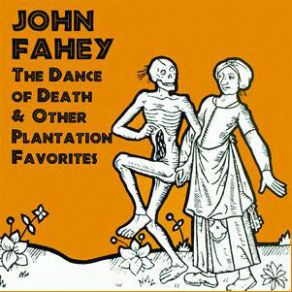The Dance of Death & Other Plantation Favorites (Remastered)
Download links and information about The Dance of Death & Other Plantation Favorites (Remastered) by John Fahey. This album was released in 1965 and it belongs to Blues, World Music, Songwriter/Lyricist, Acoustic, Contemporary Folk genres. It contains 15 tracks with total duration of 52:40 minutes.

|
|
|---|---|
| Artist: | John Fahey |
| Release date: | 1965 |
| Genre: | Blues, World Music, Songwriter/Lyricist, Acoustic, Contemporary Folk |
| Tracks: | 15 |
| Duration: | 52:40 |
| Buy it NOW at: | |
| Buy on iTunes $9.99 | |
Tracks
[Edit]| No. | Title | Length |
|---|---|---|
| 1. | Wine and Roses | 3:25 |
| 2. | How Long | 2:53 |
| 3. | On the Banks of the Owichita | 3:48 |
| 4. | Worried Blues | 2:20 |
| 5. | What the Sun Said | 10:08 |
| 6. | Revelation On the Banks of the Pawtuxent | 2:31 |
| 7. | Poor Boy | 3:16 |
| 8. | Variations On the Coocoo | 3:56 |
| 9. | The Last Steam Engine Train | 2:15 |
| 10. | Give Me Cornbread When I'm Hungry | 3:08 |
| 11. | Dance of Death | 7:35 |
| 12. | Tulip (Aka When You Wore a Tulip and I Wore a Big Red Rose) [Bonus Track] | 2:40 |
| 13. | Daisy (Aka a Bicycle Built for Two) [Bonus Track] | 1:16 |
| 14. | The Siege of Sevastopol (Bonus Track) | 1:19 |
| 15. | Steel Guitar Rag (Bonus Track) | 2:10 |
Details
[Edit]The title The Dance of Death and Other Plantation Favorites might lead some to believe that this is a collection of public-domain items that go back to the Deep South of the 19th century. However, while this 1964 session does contain a song titled "Dance of Death," most of the material (including that tune) was written by Fahey himself in the early 1960s. So an intriguing title is simply that: an intriguing title. Nonetheless, Fahey's music does have strong southern roots. Unaccompanied, the acoustic guitarist/instrumentalist demonstrates his love of African-American blues as well as the Anglo-American country, folk, and hillbilly music of Appalachia. This is essentially a folk album, but a folk album with strong country and blues leanings; in fact, numbers like "Worried Blues" and "Revelation on the Banks of the Pawtuxent" incorporate the slide guitar technique that came from Mississippi Delta blues. Not that Fahey limits himself to American influences — Appalachian music is a descendent of British, Scottish, and Irish music, and Fahey is hardly unaware of its European heritage. Further, Indian raga is an influence on the Fahey piece "On the Banks of the Owchita." Reissued on CD in 1999 with four bonus tracks (including an interpretation of "Steel Guitar Rag"), this album makes it clear that even back in 1964 Fahey was quite original.